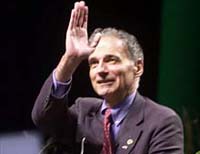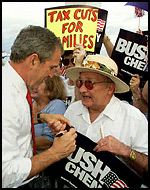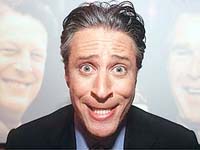|

Ozier Muhammad/ The New York Times
Gov. George W. Bush, with his nephew George P. Bush, left, and
his brother, Gov. Jeb Bush of Florida, spent a second day stumping
in Florida, where he is struggling with strong gains by Vice President
Al Gore.
|
Florida,
Where Bush Once Had a "Lock," Is Now Up for Grabs
Until early September, George W. Bush was thought to have a lock
on Florida and its 25 electoral votes. Now, the race for Florida
is a dead heat. How did Florida change from a reliably Republican
to a competitive state?
Source: The New York Times
Note: If you have not previously read the on-line New York Times,
you may have to register (for free) on the Times site to be able
to reach this page. |
|
Other Stories:
The
Gender Gap: A British View
Source: The Independent (London)
Weekly
Standard Writers Offer Their Campaign Analysis:
The WeeklyStandard
Op-Ed
Election Analysis and Commentary
Thursday, September 21, 2000
Eric L. Davis
With less than seven weeks remaining until election
day, the 2000 presidential election is shaping up as the closest
race for the White House since the Kennedy-Nixon contest in 1960.
Partisan control of the House, and possibly the Senate, hangs
in the balance as well, making this year's general elections the
most competitive since the immediate post-war years of 1946 and
1948. What are the major strategic calculations and considerations
that will occupy the candidates over the next few weeks?
What are the aspects of the campaign to which analysts, observers,
and voters will be paying the most attention between now and election
day? In this essay, I will offer some observations on these questions.
I would encourage members of the class to comment on these observations,
either through the electronic discussion conferences, or in questions
submitted during Wednesday evening's Webcast lecture.
Although the momentum of the presidential campaign is with Al
Gore as I write on September 21, the Vice President has by no
means wrapped up a victory. Although George W. Bush has not had
a good week on the campaign trail since the end of the Democratic
convention more than a month ago, time has by no means run out
for the Texas Governor.
Two forces have allowed Gore to build a lead over the past month.
First, he has closed the gap between himself and Bush on the important
character attributes of likability and leadership. From the start
of the year through the Republican convention, Bush was rated
stronger than Gore on both of these dimensions. Bush hoped that
he could continue to emphasize character, rather than issues,
in the weeks following the conventions. However, post-convention
polls show that voters have, over the past month, relied more
on issues than on character in making judgments about the candidates.
Secondly, the issues on which Gore has been campaigning - education,
health care, and Social Security - are issues that are more salient
to more Americans than the issues on which Bush had been campaigning
in late August and early September - tax cuts and military readiness.
Bush has "relaunched" his campaign several times in recent weeks
in order to adjust to an environment in which issues are more
important than the Governor's strategists had assumed when his
character-based campaign was planned. The challenge for Bush in
the weeks ahead is two-fold: he must either move the issue-based
campaign away from education, health care, and social security
onto terrain that is more favorable to him than to Gore; or he
must attempt to reduce Gore’s lead on the issues of education
and health care that voters say are most important in this year's
campaign.
Will the related set of issues of oil prices, inflation, and possibly
foreign policy (e.g., Saddam Hussein's threats to reduce or shut
down Iraqi oil exports) become more salient in the weeks ahead?
If so, which candidate will they benefit, and which candidate
will they harm? If President Clinton releases oil from the strategic
petroleum reserve, will this action have a noticeable effect on
oil prices and supply, or will it simply provoke some OPEC nations
to cut back production accordingly? If the price of gasoline and
home heating oil "spikes" before the election, will Gore be held
accountable, because of "eight years of failed energy policy,"
or will Bush and Cheney, both of whom are seen by voters as associated
with "big oil," be facing even greater problems? If the stock
market heads south in October (October is the month in which large
market declines have most frequently occurred since the late 1980s),
will the "good times" that Gore has been counting on to prop up
his campaign be seen as threatened, or will Bush's plan for partial
privatization of social security be seen as too "risky"?
Many of these themes will provide the background for the presidential
debates planned for October. These debates, especially the first
one scheduled for October 3, will be very important. For some
voters, for whom the Olympics have been the most important news
event of the past two weeks, the debates will be their first exposure
to the presidential candidates since the conventions. How will
the candidates use the debates to reinforce or change existing
voter perceptions about themselves and their opponent? What about
the undecided voters? Polls show that about 20% of voters are
still uncertain about their vote choice. How will the debates
affect these voters? Will the undecideds break toward one candidate
immediately after the first debate, or will they "hang loose"
until the final debate is over?
How will Bush and Gore adapt to the very different formats that
will be used in the three debates? The first debate on October
3, with the traditional format of candidates standing behind podiums
and answering questions posed by the moderator (PBS' Jim Lehrer)
will provide the fewest opportunities for unexpected surprises.
The second debate on October 11, where both candidates will sit
at a table with Lehrer, provides the opportunity for some interaction
between them, while the final debate on October 17, a "town hall"
style event with questions from the audience, is the least scripted
of all, and thus one for which both candidates will have to expect
the unexpected.
Most analysts have noted that this year's election will be decided
in a relatively small number of states, since both candidates
have electoral vote bases of substantially the same size. Gore's
electoral vote base is in the northeast and the Pacific coast
states, while Bush's electoral vote base is in the south, the
prairie states, and the mountain states. Neither set of base states
provides a candidate with the 270 electoral votes needed to win
the presidency.
Six states are the key battlegrounds in this year's election.
As of mid-September, most polls show that Bush is ahead in Ohio,
Missouri, and Wisconsin, with 43 electoral votes among them. Gore
appears to be leading in Illinois and Michigan, with 40 electoral
votes. According to this analysis, whoever wins Pennsylvania,
with 23 electoral votes, wins the presidency. Recent polls show
Gore with a slight lead in the Keystone State, but the Bush camp
is devoting substantial amounts of advertising dollars and the
candidate's time to Pennsylvania, and it cannot be placed firmly
in either candidate's column yet.
Those participants in the course who live in Pennsylvania are
invited to submit their comments about the election in their home
state to the electronic discussion, or during Wednesday evening's
lecture. I would be particularly interested in hearing from voters
in the Philadelphia suburbs, because they live in a part of the
state that analysts have identified as being the most closely
contested counties in a closely contested state.
Finally, how will the competitive nature of this year's election
affect voter turnout on November 7? Will the decline in presidential
election turnout that we have seen over the past 40 years - from
over 60 percent in 1960 to under 50 percent in 1996 - continue
in 2000? Or will the close election and extensive mobilization
efforts by both candidates lead to a larger share of the eligible
electorate casting ballots this year than in recent elections?
|




